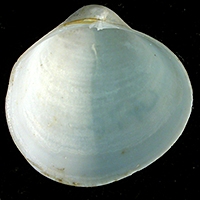|
< Previous family introduction |
|
|||||
 |
Family Ungulinidae Globe Shells
|
|||||
|
The Ungulinidae, previously known by the more descriptive name of Diplodontidae from their bifid cardinal tooth, is a family of at least 100 species (Huber, 2015). The shells are mainly white and globular, medium in size, ranging from 10 mm up to about 50 mm. They occur worldwide in warm and temperate waters, living in mud or sand, down to about 200 m in the case of the NSW species. Family Reference Lamprell & Healy (1998) catalogued the Australian species; the present work updates their treatment. Coverage All the NSW species of the family are detailed here. Identification Notes The NSW species are characterised by:
|